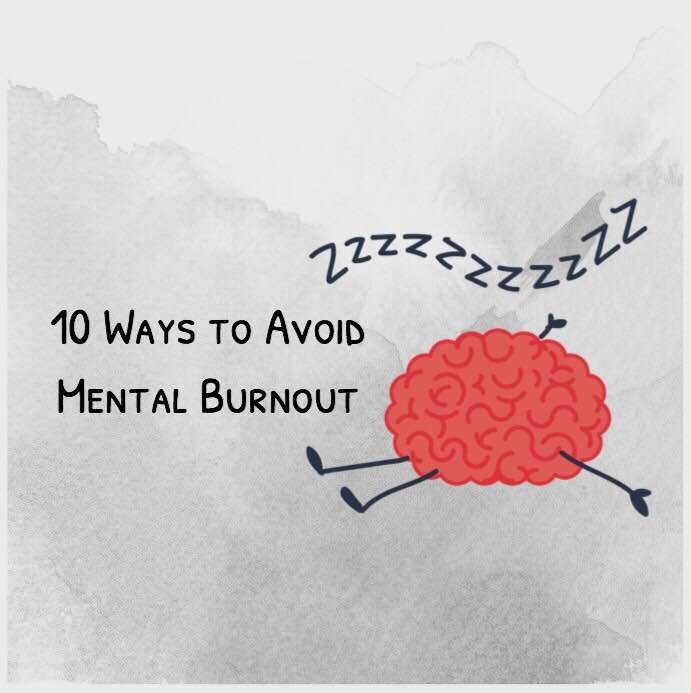According to the American Institute of Stress, job stress comprises most of the mental stress that adults feel in today’s world, and this stress costs U.S. industries $300 billion a year.
However, on top of keeping our jobs, we have many other responsibilities on our plates, too. We must take care of our kids, do household chores, pay bills, and somewhere in the mix, find time to take care of ourselves. After a while, we tend to get lost in this vicious cycle of life, our brains feel like zombie mush, and we simply feel that we can’t do it anymore.
If you have felt this way, don’t worry; many people get “mental burnout” at some point in their lives, but you can take a few precautions against feeling like this in the future.
Here are ten ways to avoid mental burnout:
1. Start making to-do lists each day.
No one can get everything done in one day, so start assigning tasks to each day of the week so that you can spread them out. Obviously, you need to factor in deadlines when you make your to-do list, but aside from that, make your lists according to convenience. Are you doing any errands that are in close proximity to each other? If so, you can knock those all out in one day, most likely. Are some errands going to take longer than others? If so, you probably don’t want to schedule too much on days when you have more tedious errands.
Simply make schedules that work for you, and don’t try to cram too much into one day.
2. Don’t take on more work than you can reasonably handle.
Don’t try to please everyone; if you can’t get something done, let them know, and don’t feel bad about it. While we might feel like superheros at times, we can’t possibly keep going at such a rapid pace without burning out eventually. In order to keep your mental health intact, you need to learn how to say no sometimes. It doesn’t make you a bad person; it makes you human. If you don’t think about your health, no one will, so make sure to turn down anything that doesn’t align with your highest truth.
3. Delegate tasks to others when you can.
Expanding on the last point, you can always ask others to take on work that you can’t. People usually love to help others out, because it makes them feel useful. Maybe one of your coworkers can write that memo instead of you, or maybe your kids can help cook dinner a few nights a week. Remember, no one person can do everything all the time, so don’t stress yourself out by trying to control and take charge of every aspect of life.
4. Make some “you” time each day.
Without making some time for yourself, you will find that you feel disconnected and downright lost in life. You need some time to go within and recharge your batteries, so allow yourself that time to just do nothing. Take a relaxing bubble bath at night, or curl up with your favorite book. Don’t bend over backwards so much for others that you forget to make time for the person that needs you the most – yourself.
5. Use some of your time to give to others.
Although “Me” time is important, we can’t lose sight of our true mission on Earth: to give love to others, and offer a helping hand to those who need it. If you have some spare time during the week, maybe try volunteering a few of those days. Not only will it bring you fulfillment, but it will give you time to connect with others in a positive way, which will alleviate stress.
6. Have a regular exercise routine.
Nothing tells stress to hit the road quite like exercising. It gets your blood pumping, your heart racing, and those endorphins rushing through your body. Without exercise, we lose our mental clarity, feel lethargic, and in general, get stressed over the littlest things. Make sure to incorporate some sort of exercise into your daily routine, so your stress doesn’t build up inside of you.
7. Have a healthy outlet for your stress.
In addition to exercise, you can also utilize other methods for controlling stress. You could write in a journal, meditate, do some gardening, get some coffee with friends, or whatever activity makes you feel good. It helps to have something to do outside of work, because we obviously didn’t come here to just put in hours at our jobs. We came here to embody pure joy, so make sure to find activities in your life that bring you that feeling.
8. Make time to spend with your friends and family.
Our friends and family keep us grounded, make us feel protected, and give us a safe place to run when life gets too overwhelming. Schedule some time during the week to catch up with the people who truly care about you.
9. Don’t put unreasonable demands on yourself and others.
This can apply to anyone, but mostly, the perfectionists, the Type A’s, and the overachievers need to hear this more than anyone. Remember, you don’t always have to be productive in order to feel worthwhile. You don’t always need to take charge of everything in order to validate your existence. Let go a little bit, and take some time to have fun and relax. Do what you can each day, but don’t overwork yourself (or others). Loosen the reigns, and you will find that mental burnouts are fewer and farther between.
10. Choose a job that matches your interests and passion in life.
Since our jobs account for most of our stress, it would make sense to choose one that brings us fulfillment. If we must work 40+ hours a week, do we really want to spend all that time doing something that we dread? Try to pick a career that doesn’t really feel like work, and this will go a long way in alleviating mental burnout.













